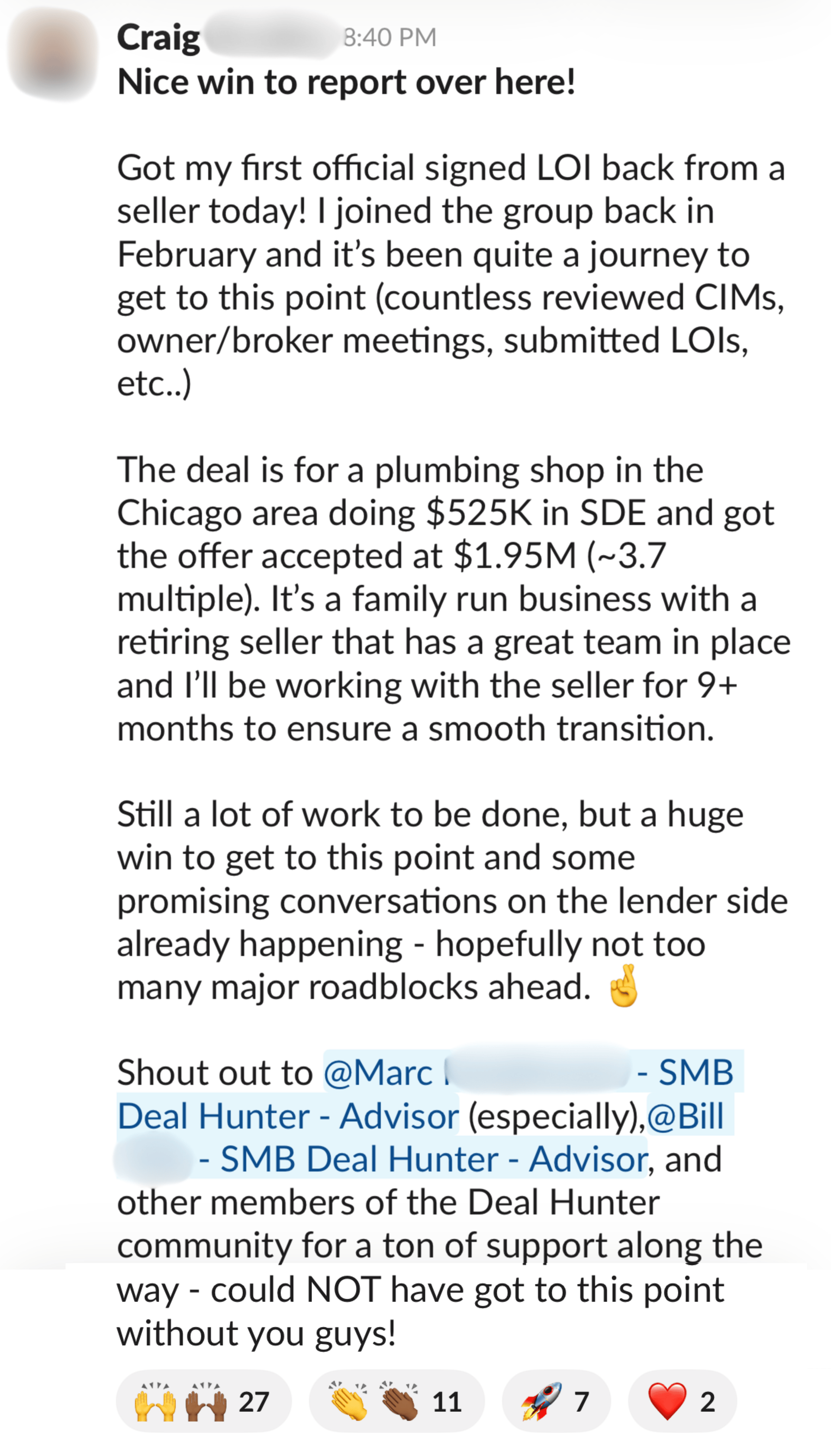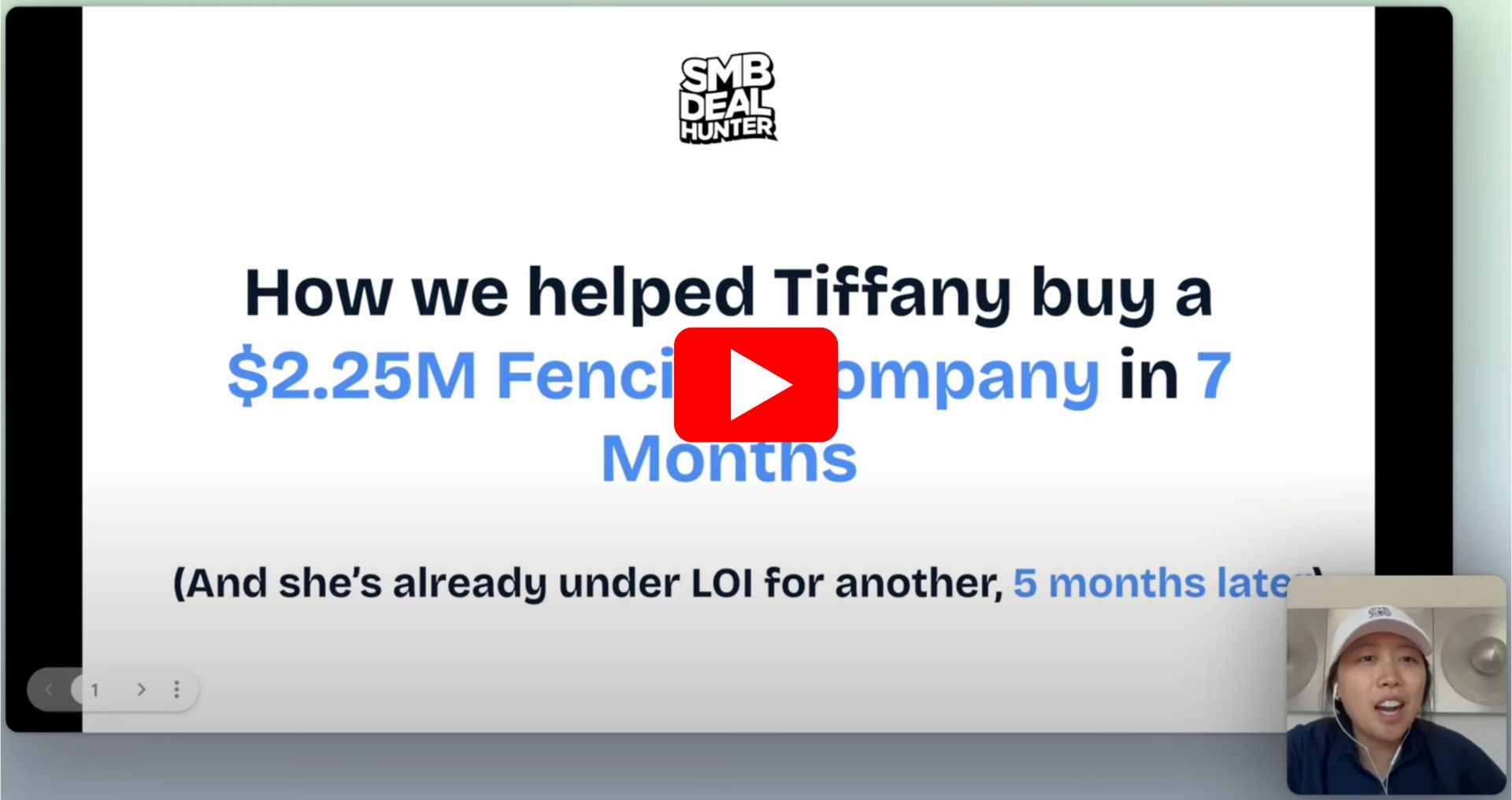- SMB Deal Hunter
- Posts
- New Deals: A gas station and liquor store with real estate, telecom installation company, and 3 other finds
New Deals: A gas station and liquor store with real estate, telecom installation company, and 3 other finds
Plus, how to mitigate seller fraud
Hello SMB Deal Hunters!
I’m excited to share 5 new businesses for sale worth checking out in this Market Watch issue. Each was handpicked from hundreds of fresh listings, with our quick take on why it stands out. First up…
🔥 Community Top Picks from the Last Market Watch Issue:
#1: Online tutoring business with $1M in EBITDA
#2: Home care company with $2.4M in EBITDA
#3: Office printer supplies e-commerce retailer with $1.2M in EBITDA
🔎 Looking for deals in your area? We can source them for you.
COMMUNITY WINS
Here’s what one SMB Deal Hunter Pro member shared this past week:

Want me and my team to work with you to find, finance, and acquire a million-dollar cash-flowing business in the next 6-12 months?
NEW DEALS
These deals span the country. For custom-sourced deals in your area, click here.
1/ Luxury Flooring Business
📍 Location: Northern Virginia
💰 Asking Price: $3,950,000
💼 EBITDA: $1,266,426
📊 Revenue: $7,143,544
📅 Established: 1994
💭 My 2 Cents: Custom flooring at the luxury end functions more like a curated design service than a retail transaction, and this 30-year-old business has built its model entirely around that distinction. Unlike commodity flooring retailers competing on price, this business has carved out a defensible position serving top interior designers, architects, and commercial clients who specify premium handmade rugs, broadloom carpets, and specialty floor coverings that can't be sourced through big-box channels. The curated mill relationships and artisan production partnerships give them access to exclusive products, while full in-house capabilities for design consultation, custom fabrication, and white-glove installation create a seamless client experience that commands higher margins and repeat business. With 20 employees split between full-time staff and specialized contractors, the model balances fixed overhead with project flexibility, and the combined retail and warehouse facility supports both showroom presentation and efficient fulfillment. I'd want to understand the revenue split between trade clients and direct retail, the concentration among top designer and architect relationships, and how deposit structures and payment terms affect working capital given the long sales cycles typical in custom specification work. Unlike commodity flooring retailers who face immediate pressure when housing slows, this business sits in the resilient upper tier where clients rarely compromise on quality, making it far less cyclical than the broader home improvement sector.
2/ Telecom Installation Company
📍 Location: New York
💰 Asking Price: $10,000,000
💼 EBITDA: $2,543,817
📊 Revenue: $20,629,425
📅 Established: 1995
💭 My 2 Cents: Telecom infrastructure sits at the center of one of the most significant secular shifts in American business: the migration from legacy cable systems to fiber-to-the-home networks that can support 5G, streaming, and broadband demand. This company has positioned itself as an outsourced labor partner for major cable and communications providers across Metro NYC, handling data, voice, and cable installation through long-term contracts that benefit from the industry-wide shift away from W-2 technicians toward contractor models. What's attractive is their entrenched relationships with Tier 1 providers who prefer to scale via external partners rather than carry the overhead and risk of internal installation teams. The business operates with a fleet of 163 vehicles and the infrastructure to deploy skilled technicians across a dense, high-value market where permitting complexity and union dynamics create real barriers to entry for competitors. I'd want to understand the revenue split between fiber installations versus legacy cable work, how contract terms and pricing are structured with key clients, and the capital intensity of maintaining and replacing their vehicle fleet and specialized equipment. I'd also dig into technician recruitment pipelines, wage inflation pressures, and what it would take to expand into adjacent metro regions given the web of licensing, certifications, and customer exclusivity agreements that govern this industry. With fiber buildouts and broadband infrastructure investment projected to grow at 8-10% annually through 2030, this business offers exposure to a multi-decade upgrade cycle that shows no signs of slowing.
3/ Security Technology Integration Company
📍 Location: Utah
💰 Asking Price: $1,790,000
💼 EBITDA: $643,513
📊 Revenue: $3,542,930
📅 Established: 2011
💭 My 2 Cents: Security integration for federal and military clients is one of those niches where trust and clearance matter more than price, and this company has built exactly the kind of sticky relationship base that's nearly impossible to replicate. They serve large corporations, government agencies, military installations, and critical infrastructure facilities, all end markets with steep procurement barriers and compliance requirements that keep smaller competitors out. What stands out is the recurring revenue stream: military contracts alone generate over $55K monthly with roughly $35K in anticipated profit, backed by multi-year service agreements that provide cash flow visibility and a 60% margin on IT services that reflects the specialized nature of the work. The business appears well positioned to expand through adjacent offerings like networking, surveillance, or access control systems, and could scale geographically into regions with similar federal or defense concentrations. I'd want to understand how mission-critical their solutions are and what switching costs look like, dig into contract duration and renewal rates, assess the current bid pipeline and win rate on new government RFPs, and understand who manages the proposal process and whether that expertise transfers with the business. As government cybersecurity spending continues its upward march, the real advantage here isn't just winning contracts but keeping them, and this integrator has already done the hard part.
ALUMNI SPOTLIGHT
Tiffany spent 15+ years in tech at companies like Dropbox and Canva, but she had never run a business herself.
And within 7 months of joining SMB Deal Hunter Pro, our business buying accelerator, she bought a $2.2M fencing business in North Carolina cash-flowing over $800K/year.
Better yet, she’s already under LOI for her second business (only 5 months after closing on her first). In this case study, we discuss:
💡 How we helped her re-price the deal after LOI (when her financial diligence revealed that the business numbers were off…)
💡 How she built an offer that would make sure the seller would stay in the business long enough to transition out (because he, his children, AND grandchildren were running essential roles in the business)
💡How she cleverly dealt with a 50% tariff hike on her business just 2 months after closing
4/ Pool Construction Business
📍 Location: Florida
💰 Asking Price: $4,800,000
💼 EBITDA: $1,500,500
📊 Revenue: $11,301,518
📅 Established: 2000
💭 My 2 Cents: This long-established, high-end residential and commercial pool builder in the Greater Orlando market is well-positioned in one of the country's strongest growth corridors. The business benefits from Florida's year-round climate, steady population influx, and continuous development activity. What stands out is their operational maturity: they have scale, brand recognition, a strong management structure, and a healthy flow of referral business. Many pool companies in this market are either small crews or subcontractor-heavy operations without meaningful internal capabilities in design and sales. This one has built out all those functions, making it both more transferable and better equipped to scale. I'd want to scope out their revenue mix between residential and commercial projects, current backlog and pipeline visibility, lead generation beyond referrals, subcontractor dependencies (excavation, shotcrete, electrical, plumbing) and how those relationships are managed, and whether there's room to layer in maintenance contracts or other recurring revenue. In a fragmented market full of undercapitalized operators, this business has built something defensible, and that's worth paying for.
5/ Gas Station & Liquor Store with Real Estate
📍 Location: Wisconsin
💰 Asking Price: $3,500,000
💼 EBITDA: $713,332
📊 Revenue: $4,600,000
📅 Established: N/A
💭 My 2 Cents: This dual-storefront package combines two of the most recession-resistant retail categories into a single high-traffic operation, with the added security of owning the real estate beneath it. The gas station and liquor store sit one storefront apart on a busy road, creating natural cross-shopping opportunities while the $2.7M in property value and $550K in fixtures and equipment provide substantial tangible asset backing. What sets this deal apart is the layered income structure: beyond fuel margins and alcohol sales, the seller has built a diversified revenue engine through a McDonald's ground lease locked in at $4,400 monthly with 2% annual escalations through 2040, plus ATM commissions, Bitcoin machine fees, billboard rental, and a 13% cut of U-Haul rentals originating from the liquor lot. The McDonald's lease alone provides $52,800 annually in passive income that should cover a meaningful portion of debt service, while the ancillary revenue streams add stability without meaningful operational burden. I'd want to understand fuel volume trends and supplier terms, the alcohol inventory mix and margin profile by category, and whether the convenience store format could support foodservice or expanded SKUs to capture more wallet share from existing traffic. The real competitive advantage here is control of prime commercial real estate in a high-traffic corridor, which creates optionality few fuel-and-convenience operators ever achieve.
THE BEST OF SMB TWITTER (X)
Using numbers to run your business (link)
Signs of a silent recession (link)
Margins are what really matter (link)
Thoughts on submitting an LOI (link)
A broker insisting on their purchase agreement is a huge red flag (link)
Analysis of your advisors on an SMB deal (link)
How to mitigate seller fraud (link)
COMMUNITY PERKS
• Ready to buy and operate a $1M+ business? Partner with my team and get expert support at every step.
• Want to invest passively in SMB acquisitions? Get access to investment opportunities.
• Get a personal introduction to my preferred SBA 7(a) lender, non-SBA lenders, Quality of Earnings providers, or legal counsel
• Raising capital for your deal? I’ll connect you with investors from the SMB Deal Hunter Community.
• Interested in selling your business? I’ll help you connect with buyers from the SMB Deal Hunter Community.
RECENT PODCAST EPISODE
Bill was an Army officer who bought his first gym with zero experience right after his MBA.
And after spending the first few years in the business, he was able to work himself completely out of the day-to-day.
And now, he’s opening his 4th location.
And for our audio-only listeners, jump in and listen on Spotify or Apple Podcasts!
THAT’S A WRAP
See you tomorrow!

-Helen Guo
Find Me On Twitter
Find Me On LinkedIn
P.S. I'd love your feedback. Tap the poll below or reply to this email.
How was today's newsletter? |
Disclaimer
This publication is a newsletter only and the information provided herein is the opinion of our editors and writers only. Any transaction or opportunity of any kind is provided for information only; SMB Deal Hunter does not verify nor confirm information. SMB Deal Hunter is not making any offer to readers to participate in any transaction or opportunity described herein.

